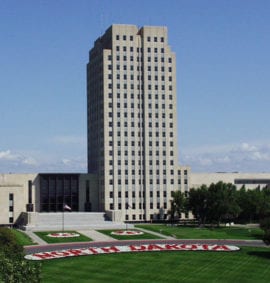Despite a nationwide outcry during the 2018 election cycle, North Dakota’s discriminatory voter ID law remains on the books. While the cameras have turned their attention elsewhere, the fight to stop this flagrant voter suppression continues in the courts.

North Dakota has a long history of discriminating against Native Americans generally and denying Native Americans the right to vote in particular. Leading up to and during the 2018 elections, North Dakota Native voters saw an outpouring of support as they fought to be able to vote under the state’s recently enacted voter ID law. The law, which went into effect as the election was getting underway, required voters to have identification that included a current residential address. This requirement poses a problem unique to Native American voters because the state and counties have failed to provide basic governmental services for individuals living on rural reservations. Specifically, they have neglected to correctly and uniformly assign residential addresses for Native American residents.
The law, as applied to Native Americans living on reservations, is unconstitutional and violates the Voting Rights Act. For that reason, the Spirit Lake Tribe and Standing Rock Sioux Tribe together with individuals Dion Jackson, Kara Longie, Kim Twinn, Terry Yellow Fat, Leslie Peltier, and Clark Peltier, filed suit asking the courts to declare the law unconstitutional and to stop the enforcement of the ID and address requirements for residents of certain affected reservations and counties on February 28, 2019. According to NARF Staff Attorney Jacqueline De León, “Despite significant public outrage at North Dakota’s discriminatory voter ID law, that law still is on the books. Tribes continue to commit significant resources and time working to ensure that their citizens will be able to simply participate in state and federal elections as is their constitutional right. NARF is proud to stand with the Spirit Lake and Standing Rock Sioux Tribes, and our brave individual plaintiffs, as they fight to fix the state’s broken voter ID laws.”
Many Native Americans who live in North Dakota have no residential address because the government has not assigned them one. Others have been assigned an address, but it was never communicated to them. Road signs are rare in rural areas of reservations, and many roads in North Dakota have been assigned multiple, conflicting names. Homes have been assigned multiple, conflicting numbers. Some homes have been identified as occupying two cities and zip codes. The lack of uniformity in addressing across North Dakota reservations creates a problem that could affect thousands of potential Native American voters. The state claimed that it could fairly administer the voter ID law, but the 2018 election showed otherwise. Voters with IDs listing their current addresses had their absentee ballot applications rejected as having “invalid” addresses.
NARF is committed to the long-term fight to protect tribal citizens’ voting rights. It is only with a functioning democracy that we can work towards an equitable society. The Tribes are represented by NARF and co-counsel, Campaign Legal Center and Tim Purdon.
Read more about Spirit Lake Tribe v. Jaeger and the on-going fight to stop this discriminatory law.
More blog posts

